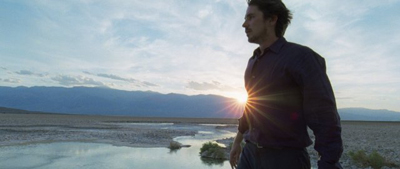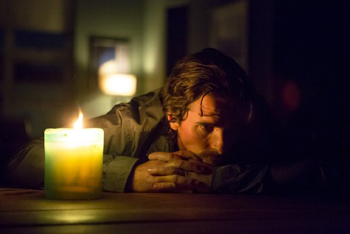For Sunday May 8, 2016
Lectionary Readings (Revised Common Lectionary, Year C)
Acts 16:16–34
Psalm 97
Revelation 22:12–14, 16–17, 20–21
John 17:20–26
A couple months ago I watched the new Terrence Malick film Knight of Cups. Until recently, the famous recluse had made only five films in about forty years. Now, at the age of seventy-two, he seems to have entered a prolific phase.
In 2011 there was The Tree of Life, then in 2013 To the Wonder. Now comes Knight of Cups. He also has two more films in post-production — an IMAX documentary about the cosmos called Voyage of Time, and then a film about two intersecting love triangles called Weightless.
For Malick fans, this is great news, but even those who admire his work can feel ambivalent about his films. One reviewer called Knight of Cups "sophomoric," and another "a ludicrous self-parody." "That was a long two hours," said my friend as we left the theater.
Such ambivalence isn't surprising for a movie that has no script and no dialogue, only improvisations based upon character descriptions at the beginning of each day's shoot. The movie challenges viewers with both its form and content.
There's no linear narrative in Knight of Cups, just dreamy fragments and whispery voice overs. A friend of mine described it as more like a painting than a story. This collage of images is actually a good reason to see the film — the cinematography of Emmanuel Lubezki, who won Oscars for The Revenant, Gravity, and Birdman, serves up a visual feast.
The impressionistic and fragmentary images mimic the life of Rick (Christian Bale), an indulgent LA screen writer who drifts through the scenes staring into space and searching for some meaning. Rick is an excessively prodigal pilgrim. By his own description, he's a deeply lost soul.
 |
|
Christian Bale in Knight of Cups.
|
He laments how he's "spent thirty years ruining my life instead of living it. Where did I go wrong? All those years living the life of someone I didn't know. I can't remember the man I wanted to be."
The fragments of his life lack any coherent narrative: "You think when you reach a certain age things will start making sense, and you find out that you are just as lost as you were before. I suppose that's what damnation is. The pieces of your life never to come together, just splashed out there."
Making things worse, Rick lives in a world "with no principles, only circumstances."
Knight of Cups is a journey story. The movie begins with and contains subsequent voice over readings from John Bunyan's Pilgrim's Progress (1678), which, you might recall, "was delivered under the similitude of a dream" — just like this movie. There's also a reading from Psalm 51.
There are many signs and messengers, if Rick could see them — the beauty and terror of the natural world. Joyful children and lonely old people. Homeless vagrants sprawled in the gutter and the decadent rich laughing at their pool parties. Rick also has flashbacks of family traumas. Buddhist and Catholic priests offer wisdom, as do a fortune teller and Tarot Cards.
There are also those most powerful of twin forces, thanatos and eros — lots and lots of loveless eros. But eros isn't agape. One of Rick's six women challenges him: "You don't want love, you want a love experience."
Our sufferings and troubles, suggests a priest, are really gifts from God to point us to a better way: "To suffer binds you to something higher than yourself, higher than your own will. Takes you from the world to find what lies beyond it."
But it's not clear whether Rick wants to hear or act upon these messages. He wears a smirk in some scenes. One reviewer noted the ambivalence that he felt when watching — whether he envied or pitied Rick.
For me, Knight of Cups is a mashup of the Book of Ecclesiastes and the parable of the Prodigal Son. For those of us who want to find that narrow way to a better life, the film is an invitation to conversion.
Conversion is what we have in the reading this week from the book of Acts — two more conversion stories that follow several other conversion stories that Luke has previously described, most notably those of Peter and Paul.
 |
|
Christian Bale in Knight of Cups.
|
Both stories are "household conversions" of entire families — the business woman Lydia of Thyatira, "a dealer in purple cloth" who's often called the first European convert, and then the Philippian jailer, who famously asked the question that troubles Rick: "What should I do?"
Despite all the fragmentation of both story and image, Malick often ends his films with a sort of response to the question of the Philippian jailer. In The Tree of Life, the film opens with the observation that one can live "by nature or by grace." It ends with a deeply human prayer: "Help us. Guide us till the end of time." And then a (divine) response: "Follow me."
In To The Wonder, Javier Bardem plays a Catholic priest who struggles with all the pain and sorrow he experiences: "All I see is failure, destruction, and ruin." The last line of the movie commends gratitude amidst all our pain and confusion: "Love that loves us, thank you."
In Knight of Cups, numerous faint voice overs point Rick to a better way. "Remember." "Wake up." And from his lover Della: "We're not leading the lives we were meant for. We were meant for something else."
I especially like the very last word in the movie: "Begin."
 |
|
Christian Bale in Knight of Cups.
|
That's wise advice for those of us who want to change, but who also feel stuck in our old ways. Repentance isn't primarily feeling bad about the past, it's about mending our ways for a better future. And to do that, we need to make a beginning, however small.
Never stop starting over, advises the fifth-century Egyptian desert father Arsenios: "Abba Poeman said regarding Abba Prin that every day he made a new beginning." "My God, do not abandon me. I have done nothing good before Thee, but grant me, in Thy compassion, the power to make a start."
The last word of Knight of Cups also reminded me of the poem by Edwina Gateley called "Beginnings," from her book There Was No Path So I Trod One (1996, 2013):
Beginnings—
just tiny stirrings
which disturb our even surface,
prodding us into new and different shapes...
claiming their place
on our horizons—
stretching us
where we would not go—
yet we must.
Driven by life forces
deeper than our dreams,
we dare to rise
and grasp towards
the new young thing—
not yet born—
but insistent—
like a tight seed bursting
for life,
carrying within it
all the power
of a woman's
birthing thrust.
You can be sure of this — conversion never ends; it's a life-long process. It requires a life of many new beginnings.
Note: On conversion see the new book by Susan Jacoby, Strange Gods: A Secular History of Conversion (New York: Pantheon, 2016), 512pp.
Image credits: (1) IMDB.com; (2) IMDB.com; and (3) IMDB.com.





